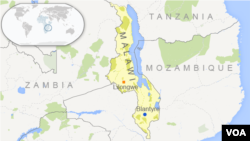El Nino-induced drought decimated this year’s harvests throughout Southern Africa, and Malawi’s government now says the number of people there who will need food aid has tripled to over eight million.
The latest figures are a huge leap from the 2.8 million that the government said needed food aid in April when President Peter Mutharika declared the state of national disaster.
Agriculture Minister George Chaponda says the numbers given in April were based on a partial survey but they have now completed surveys of all of the country’s 28 districts.
"The production of maize during 2014/15 as compared to 2015/16, there was a shortfall of 12.4 percent. As a result of this, if we don’t do any action, there will be 8.4 million people affected," said Chaponda.
That is about half of Malawi's population.
Chaponda says 1.3 million metric tons of maize are needed. He says the government is currently purchasing maize from local traders as well as other countries like Zambia.
Food security activist Tamani Nkhono says the country will need international funds.
“If you look at the cost of doing that, it should be in the range of 250 and 300 billion Malawi kwacha ," said Nkhono. "So I don’t think the government has that kind of money to do the importation.”
The figure he cites is equivalent to between $360 million and $430 million.
So far, the U.S. and Chinese governments have donated money. But U.N. relief agencies warn that without rapid action, food shortages throughout Southern Africa will continue to worsen into early next year.
The International Federation of the Red Cross says the number of food insecure people in the region may climb as high as 49 million.

